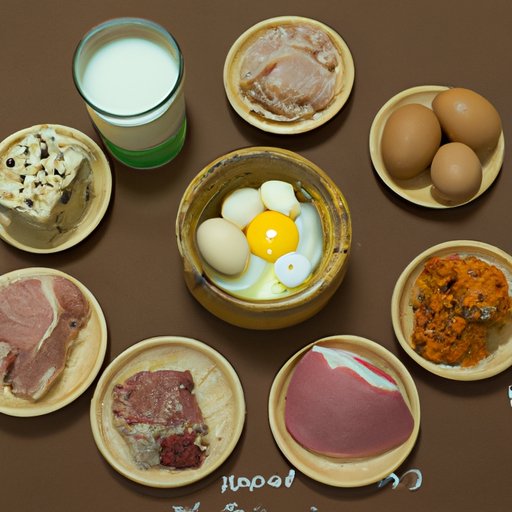
Introduction
Protein is an essential nutrient that plays a vital role in many bodily functions. It helps build and repair tissues, produces enzymes and hormones, and supports the immune system. A diet that includes enough protein can also help you feel fuller for longer periods, which can aid in weight management.
In this article, we’ll explore various ways to increase your protein intake and help you achieve a healthier diet.
Incorporate Protein-rich Foods into your Diet
One of the easiest ways to incorporate more protein into your diet is to consume protein-rich foods. Many animal products are high in protein, such as dairy products, meat, and fish. For vegetarians and vegans, plant-based protein sources such as legumes, nuts, and seeds are excellent options.
Getting enough protein from food depends on many factors, including your age, gender, weight, and activity level. A general rule of thumb is to consume around 0.8 grams of protein per kilogram of bodyweight each day. For example, a person who weighs 68 kg should consume approximately 54 grams of protein per day.
The recommended portion sizes for protein-rich foods are as follows:
- 3 ounces of meat, poultry, or fish
- 1 cup of dairy products
- 1/2 cup of legumes or tofu
- 1/4 cup of nuts or seeds
Here are some recipe ideas to help you incorporate these foods into your meals:
- Grilled chicken or fish with a side of roasted vegetables
- Vegetarian chili with kidney beans and vegetables
- Yogurt parfait with berries and nuts
- Tofu stir-fry over brown rice
- Quinoa salad with avocado, chickpeas, and cucumber
Add Plant-Based Protein Supplements
Another way to increase protein intake is to add plant-based protein supplements to your diet. Supplements like pea protein, hemp protein, and rice protein are excellent for vegetarians and vegans who cannot consume animal products. They’re also ideal for individuals who want to avoid dairy-based protein supplements like whey.
Plant-based protein supplements offer many benefits, including being a vegan and vegetarian-friendly option, easier for the body to digest, and lower in saturated fats. They can easily be blended into smoothies, shakes, or bars.
Here are some suggestions for using plant-based protein supplements:
- Blend pea protein powder with almond milk, banana, and peanut butter for a post-workout shake.
- Add hemp protein powder to a smoothie with kale, pineapple, and ginger for a healthy breakfast option.
- Bake rice protein powder into energy bars with nuts, seeds, and dried fruit for a quick snack.
It’s important to note that relying too much on supplements can be harmful to your health. Including various protein sources in your diet is critical to a balanced protein intake.
Increase Protein with Protein-Rich Beverages
Another way to incorporate protein into your diet is to drink protein-rich beverages. Whey protein shakes, smoothies, and protein-enriched coconut water are excellent options for those who want a quick, easy, and portable way to increase their protein intake.
It’s essential to choose a protein shake that’s low in sugar to avoid adding unnecessary calories to your diet. High sugar intake can lead to weight gain and health issues such as diabetes and heart disease. To avoid this, choose a shake or smoothie that’s low in added sugars and high in protein.
Here are some suggestions for incorporating protein-rich beverages into your diet:
- Replace an afternoon snack with a whey protein shake.
- Add a scoop of protein powder to your favorite smoothie recipe.
- Drink protein-enriched coconut water instead of sugary drinks like soda or fruit juice.
Make Protein-Rich Breakfasts
A high-protein breakfast can provide you with the energy you need to start your day and keep you full for longer periods. Foods such as Greek yogurt, eggs, and protein smoothies are excellent ways to increase protein intake in the morning.
Skipping breakfast or choosing low-protein options can lead to snacking more throughout the day, which can negatively affect your health and weight. Consuming a high-protein breakfast can help prevent this.
Here are some recipe ideas for high-protein breakfasts:
- Omelet with spinach, mushrooms, and goat cheese
- Protein pancake made with oatmeal, egg whites, and bananas
- Yogurt with berries and almonds
- Protein smoothie bowl with mixed fruits and protein powder
Add Variety to Meals with Protein-Rich Snacks
Adding protein-rich snacks to your diet can help prevent overeating and increase your protein intake. Nuts, seeds, and protein bars are excellent options for high-protein snacks.
It’s essential to choose snacks that are nutritious and low in calories. Consuming snacks that are high in calories and low in nutrients can lead to weight gain and health issues.
Here are some suggestions for incorporating protein-rich snacks into your diet:
- Trail mix made with almonds, pumpkin seeds, and dried cranberries
- Hummus with sliced vegetables
- Apple slices with almond butter
- Protein bar made with nuts and seeds
Replace Processed Foods with Protein-Rich Alternatives
Processed foods are often low in nutrients and high in calories, leading to weight gain and health issues. You can replace these foods with protein-rich alternatives, such as grilled chicken, baked salmon, and roasted chickpeas to increase protein intake while reducing calorie intake.
Here are some recipe ideas for incorporating these foods into your meals:
- Grilled chicken with roasted sweet potatoes and green beans
- Baked salmon with quinoa and steamed broccoli
- Roasted chickpeas with mixed vegetables and hummus dip
- Grilled tofu with brown rice and stir-fried vegetables
Conclusion
Incorporating more protein into your diet doesn’t have to be challenging or boring. By adding plant-based supplements, drinking protein-rich beverages, and consuming protein-rich foods and snacks, you can easily increase protein intake while boosting overall health.
Remember to speak with a nutritionist before making any significant dietary changes. Also, consider tracking your protein intake to ensure you’re getting enough to meet your individual needs. By choosing high-quality, nutrient-dense protein sources, you can achieve a healthier and more balanced diet.




